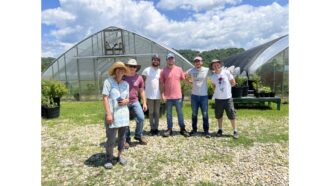A recent Northeast SARE Research and Education project explored how small-scale farmers can better work with their soil.
In LNE21-420, "Developing an Affordable Soil Health Test for the Appalachian Region to Incentivize Sustainable Agricultural Production", researchers from West Virginia University and University of Kentucky led by Dr. Eugenia Pena-Yewtukhiw from WVU worked with more than two dozen farms to create a system of field testing that in some instances generated actionable data that rivaled the efficacy of traditional lab testing.
Key insights from the project included tracking soil health trends over time, strongest predictors of soil health, the effect of high tunnel systems on soil aggregation, and more. The project also created a DIY soil test kit approximately 1/3rd the cost of sending away samples for basic testing.
This project has provided important new insights into soil health testing, economic feasibility, and farmer adoption. However, the work is far from complete—there is still much to explore regarding the best ways to measure, interpret, and apply soil health indicators in real-world farm management.
The project, which emphasized both farmer input and assessing a variety of farm types, successfully developed strategies and tools that farmers can use to improve the health of their soil as well as their bottom line, according to Research and Education Grant Administrator Heather Omand.
“This project uncovered valuable information about the barriers farmers face around using and understanding soil testing to inform their farming practices. They created many accessible tools that farmers can use to break down those barriers that can be found in their final report!" they said. "They also identified several lines for future inquiry and effort that I hope to see explored.”
Moving forward, the project leaders plan to:
- Pursue additional funding to expand soil health research and outreach.
- Strengthen collaborations with extension agents, researchers, and industry partners to refine soil health testing strategies.
- Build on the momentum of this project to develop practical, cost-effective solutions for improving soil health in the Appalachian region.
With continued research and investment, they hope to refine testing approaches, strengthen farmer adoption, and develop better strategies to improve soil resilience, farm profitability, and environmental sustainability.
